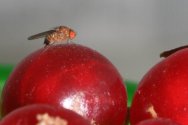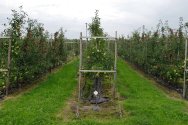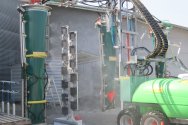
Worldwide innovative and sustainable growing of fruit
The applied fruit research activities at Wageningen University & Research (WUR) contribute to the systematic development of sustainable and cost-effective production systems for the worldwide fruit sector.
The results of scientific research and practical knowledge are combined in order to provide practical innovations and concepts. The fruit research at WUR links science with commercial practice, an essential aspect for growers and other stakeholders looking to realise viable production.
Experimental orchard
Situated in the heart of the Dutch fruit-growing region, an experimental orchard of 18 ha, is used for demonstration and research purposes.
Private sector and governments
We conduct applied fruit research on behalf of government agencies, the European Commission, public bodies, the private sector including fruit growers and supply companies, and development agencies.
Our research is focussing on 5 themes:
- Sustainable and innovative production systems
- Plant health
- Healthy soil and efficient water use
- Quality in the chain
- Green and well-being
Worldwide projects
Currently we are conducting projects in Europe and China.
We also participate in many Dutch public-private partnership projects that are dealing with global problems like soil degradation, storage losses and emission reduction of crop protection agents.
Some examples of flagship projects:
Pest and disease management in Europe
A cost-effective approach against pests and pathogens is being developed for the European fruit sector within the DROPSA project. WUR scientists are cooperating with other research partners in the research on the biology and epidemiology of Xanthomonas fragariae, the host plant range, biological control of Drosophila suzukii and the economic viability of the proposed alternative treatments.
WUR is responsible for the DROPSA project’s research into the introduction and dispersal of Drosophila suzukii, the biology and epidemiology of Xanthomonas fragariae and the economic viability of the proposed alternatives.
Organic control of dwarf cherry in China
Soilless cultivation of apples and blueberries
Soilless cultivation offers new opportunities for growing apples on sandy soils. Soilless cultivation in trenches, for example, is a potential solution to apple replant disease and other major soil problems. The cultivation of apples in trenches produces higher yields than regular orchards and is also more sustainable as fewer chemical plant production products are required to achieve healthy yields.
Soilless cultivation also offers opportunities for growing blueberries. Cultivation of blueberries in containers leads to higher yields. Cost price reductions can be achieved via shorter plant establishment periods and more efficient use of the available ground surface.
Innovative spray application techniques
New innovative application techniques can be used to significantly reduce the emission of crop protection products. It may also be possible to cut the amount of crop protection products used as these new application techniques ensure a higher deposition in the tree and a better and more uniform crop coverage.
WUR fruit scientists are collaborating with partners in a public-private consortium. The consortium is committed to developing new application techniques for fruit crops via crop-dependent spraying based on crop volume or crop row volume dosage. This is expected to result in application techniques in the highest drift reduction class of at least 95%.
Optimal fruit quality in the chain and for consumers
As apples and pears are normally stored for a long time after harvest in the Netherlands, consumers enjoy fresh fruit year-round. However, it is currently impossible to predict changes in fruit quality during storage. This means some batches of fruit are stored too long, resulting in severe losses from fungal diseases and decreased quality.
WUR is developing techniques to predict the storage potential of fruit at harvest and is testing these techniques under commercial conditions.
EUFRUIT
The EUFRUIT thematic network is a project that unleashes, stimulates and uses European research potential for exploiting new opportunities in the fresh produce category. WUR scientists are responsible for the project research aiming at secure and sustainable fruit production.
This project will be facilitating the access to knowledge and the dissemination of existing research and innovation potential for the benefit of the fresh produce sector and consumers.




